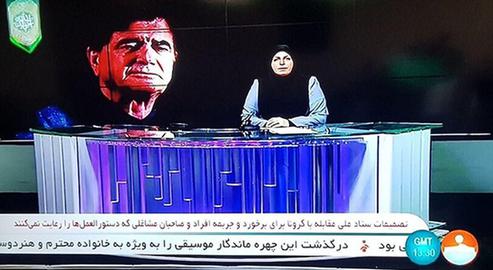The death of Mohammad Reza Shajarian, a towering figure in Iranian music, happened to take place at a time when many newspapers and printers in Iran were closed due to religious holidays. For this reason, coverage of the events surrounding the artist's death has mostly been published on their websites or in special e-editions of the newspapers. These are the same Iranian government-controlled outlets that have refused to mention Shajarian's name for several years now.
This report analyses how the media in the Islamic Republic has covered the passing of a cultural icon, who fell out of the government’s favor but remained loved by all.
Posthumous Reversal of a Publishing Ban
The Islamic Republic of Iran Broadcasting (IRIB) had imposed a strict moratorium on publishing the name, image or recordings of Mohammad Reza Shajarian after he criticized the regime in 2009. But the state broadcaster rushed – ahead of other Iranian media outlets – to announce his death. The haste was so pronounced that an IRIB reporter first claimed Shajarian had died several days ago, before he actually passed away on the Thursday. This blunder provoked a sharp response from professional journalists inside and outside Iran.
On Thursday, October 8, at the same time as the official announcement of the death of Shajarian’s death in Iran, the IRIB broadcast his name, photograph and voice for the first time in more than a decade. In news items about the death of Shajarian, the great singer was described by the IRIB as “an everlasting figure in music".
The IRIB also covered the funeral of Master Shajarian. This was taking place even as a mourning crowd, gathered in front of Jam Hospital in Tehran, was chanting slogans in opposition to the platform.
The confrontation between the IRIB and Mohammad Reza Shajarian reached its peak following the controversial 2009 Iranian presidential election. After Mahmoud Ahmadinejad used a post-election speech to call demonstrators’ claims of electoral fraud “a bunch of rubbish”, Shajarian reacted by sending an open letter to the directors of the IRIB. In the shock missive, the singer said he no longer wanted his voice to be broadcast on Islamic Republic television. In a follow-up interview with the BBC’s Persian service, he emphasized: "Shajarian's voice is the voice of a bunch of rubbish – and will always be the voice of a bunch of rubbish."
Hamshahri Publishes Special Night Issue
The Tehran-based Hamshahri newspaper published a special electronic edition on the night of Mohammad Reza Shajarian's death. The issue mostly comprised tributes and memories to the musical behemoth from Iranian journalists and fellow artists. But Morteza Kardar, the newspaper’s culture correspondent, described the moments leading up to the official announcement of Master Shajarian’s death.
This short column alleged that heavily-armed police forces had gathered around Jam Hospital just before the news broke. According to Kardar, some of the officers were blocking journalists from working and threatening to confiscate their mobile phones. "Do not film, or we’ll take your phone away,” they were quoted as saying to reporters.
‘Shajarian Dies’: Clipped Reports by Pro-Government Media
State-controlled Iranian media outlets by and large kept their reporting of Mohammad Reza Shajarian’s death short and unembellished. There was no mention of his artistic or political importance to Iranians. By contrast, the deaths of other famous musicians in Iran – those that stayed on the regime’s good side – have been covered in meticulous detail and adorned with tributes.
Fars news agency, which is affiliated with the Islamic Revolutionary Guards Corps, broke the news under the simple headline Mohammad Reza Shajarian Died. Its copy simply referred to him as “an Iranian singer”. The agency did emphasize, however, that American doctors had given up on his cancer treatment and as a result Shajarian had returned to Iran two and a half years ago. It also listed his birthplace and noted that he would be buried in Mashhad; in fact, as the grand master’s son Homayoun Shajarian has said, he will be buried next to none other than the monolithic Persian poet Ferdowsi in the city of Tus.
In a short video report, FarsPlus, a sub-section of Fars News Agency that provides special reports on current affairs, described Mohammad Reza Shajarian as a "companion of the Islamic Revolution." It claimed his political comments in recent years had cast a shadow over his musical works.
Coverage of Shajarian’s Burial Hampered by ‘Security’ Constraints
Pro-reformist Iranian media outlets have published the bulk of coverage of Mohammad Reza Shajarian’s death. Despite this, social media users and journalists have claimed that just a handful of reporters were allowed to cover the artist’s funeral.
Sharq newspaper only published a short report on Shajarian's death and the course of his illness, while Mardom-Salari went further, publishing scenes from the Iranian singer’s previous concerts. Meanwhile, the IRIB and IRNA – the official news agency of the Islamic Republic – have been allowed to cover the transferal of Shajarian’s body from Tehran to Tus, its final resting place.
Related coverage:
Mohammad Reza Shajarian: Iran’s Most Beloved Banned Singer
Millions of Iranians Fear the Worst for Banned Superstar Singer
Music Icon Shajarian, who Fought Injustice in Life, Will be Honored in Death

























comments